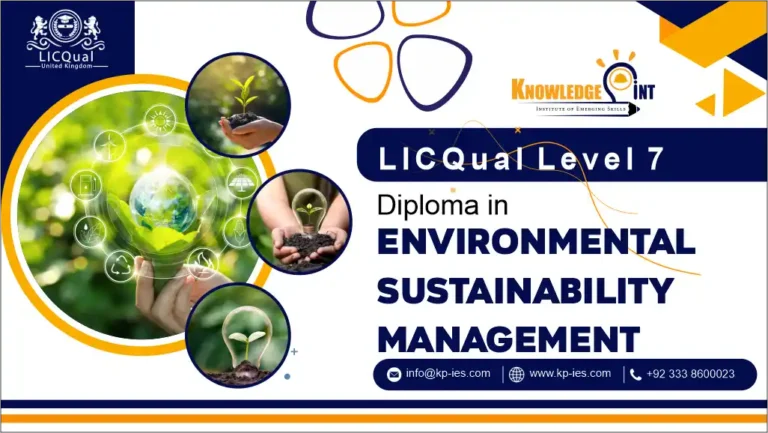In today’s rapidly advancing world, the intersection of technology and biotechnology is opening up new possibilities in fields like healthcare, agriculture, environmental sustainability, and pharmaceuticals. If you are interested in pursuing a career that combines biological sciences with engineering technologies, the ICTQual Level 2 Diploma in Biotechnology Engineering offers a fast-track, hands-on path to developing essential skills in this exciting field. With 30 credits earned over just 3 months, this qualification provides you with the foundational knowledge and practical skills necessary to enter the world of biotechnology engineering.
The ICTQual Level 2 Diploma in Biotechnology Engineering is designed to introduce students to the key concepts and practical applications of biotechnology and engineering technologies. Over a brief period of 3 months, students will gain a solid understanding of biotechnology principles while learning how to apply engineering techniques to solve problems in biological sciences. This diploma is ideal for those looking to enter the biotechnology industry quickly or gain foundational skills for further studies.
The ICTQual Level 2 Diploma in Biotechnology Engineering is a comprehensive and fast-paced qualification that equips students with foundational skills in biotechnology and engineering. It is perfect for individuals looking to start a career in the exciting and rapidly growing field of biotechnology. Whether you want to work in healthcare, agriculture, or environmental sustainability, this qualification provides a solid entry point into a wide range of industries. With a strong practical focus and the opportunity for further studies, it offers a promising future in the world of biotechnology engineering.
Course Overview
The ICTQual Level 2 Diploma in Biotechnology Engineering 30 Credits consists of 3 mandatory units which are as follows.
- Introduction to Biotechnology Engineering
- Engineering Principles in Biotechnology
- Health, Safety, and Ethical Considerations in Biotechnology Engineering
Learning Outcomes for Biotechnology Engineering Units
1. Introduction to Biotechnology Engineering
- Understand the Role of Biotechnology in Modern Industry: Identify key applications of biotechnology in various industries such as healthcare, agriculture, and environmental management.
- Explain Basic Biotechnology Concepts: Demonstrate an understanding of the core concepts in biotechnology, including genetic engineering, bioprocessing, and biomaterials.
- Identify Biotechnology Engineering Systems: Recognize the different biotechnology systems and technologies used in laboratory and industrial settings, such as bioreactors and fermentation systems.
- Understand the Relationship Between Biology and Technology: Explain how biological processes are harnessed and optimized using engineering principles in biotechnology applications.
- Apply Basic Biotechnology Techniques: Develop the ability to perform basic biotechnology experiments and understand the practical aspects of biotechnology engineering.
2. Engineering Principles in Biotechnology
- Apply Engineering Concepts to Biological Systems: Understand how traditional engineering principles, such as thermodynamics, fluid mechanics, and materials science, are applied to biological systems in biotechnology.
- Design Biotechnological Systems: Demonstrate the ability to design and analyze systems for the production of biological products such as enzymes, proteins, and biofuels.
- Analyze Bioprocesses and Systems: Evaluate the efficiency of biotechnological processes and systems, identifying areas for optimization and improvement.
- Utilize Engineering Tools for Biotechnology: Employ engineering tools such as computational models and simulations to improve biotechnological processes and systems.
- Understand the Integration of Engineering and Biological Sciences: Explain how biotechnology engineering integrates biological science with engineering to solve real-world challenges in industry.
3. Health, Safety, and Ethical Considerations in Biotechnology Engineering
- Adhere to Health and Safety Regulations: Identify and apply relevant health and safety regulations in biotechnology laboratories and industrial environments.
- Assess Potential Risks in Biotechnology Work: Evaluate potential health risks associated with biotechnology work, such as handling genetically modified organisms (GMOs) or hazardous chemicals.
- Implement Best Practices in Laboratory Safety: Demonstrate safe laboratory practices, including the use of personal protective equipment (PPE), proper disposal of materials, and handling biological agents.
- Understand Ethical Issues in Biotechnology: Identify ethical considerations related to genetic modification, stem cell research, and other biotechnology innovations, and explain how these issues are addressed in the field.
- Promote Sustainable Biotechnology Practices: Understand and apply sustainable practices in biotechnology, considering environmental, social, and economic impacts.
Benefits of the ICTQual Level 2 Diploma in Biotechnology Engineering (30 Credits – 3 Months)
- Foundational Knowledge in Biotechnology:
This course provides a solid understanding of the fundamental concepts of biotechnology engineering, including genetic engineering, bioprocessing, and the role of biotechnology in various industries. This foundation prepares learners for further studies or entry-level positions in biotechnology-related fields. - Hands-on Learning:
Students will gain practical knowledge through hands-on experience, allowing them to work with biotechnology systems, including bioreactors and laboratory equipment. This practical experience enhances technical skills and prepares students for real-world applications in the biotechnology sector. - Industry-Relevant Skills:
The course equips students with skills in biotechnology engineering that are directly applicable to industries such as healthcare, agriculture, pharmaceuticals, and environmental management. It addresses the growing demand for professionals who can work in advanced biotechnology settings. - Understanding of Ethical and Safety Standards:
A key benefit of the course is its focus on health, safety, and ethical considerations in biotechnology. Students will learn how to navigate the regulatory landscape and follow ethical practices while working in potentially high-risk areas like genetic modification and bioprocessing. - Career Advancement Opportunities:
Completing this course opens up career pathways in biotechnology-related fields. Graduates may pursue roles as laboratory assistants, biotechnologists, or junior engineers in sectors like pharmaceuticals, research, and environmental sustainability. - Short Duration with a Focused Curriculum:
The 3-month duration of the course makes it ideal for those seeking to enhance their knowledge in a short time, without a long commitment. The focused curriculum ensures students quickly acquire the essential skills and knowledge to begin their careers in biotechnology. - Industry Relevance and Demand:
Biotechnology is an expanding industry with increasing demand for skilled professionals. This course provides an up-to-date education, ensuring graduates are well-positioned to enter a high-demand sector that continues to evolve with technological advancements. - Versatility in Career Pathways:
The knowledge gained from this diploma can be applied across multiple industries, including healthcare, agriculture, food production, and environmental conservation. The versatile nature of the skills learned enhances employability and opens doors to a range of roles in biotechnology engineering. - Stepping Stone for Further Education:
For students aiming to continue their education, this diploma provides the foundational knowledge required for more advanced studies, such as pursuing a higher-level diploma or degree in biotechnology or related fields. - Professional Recognition:
Completing this internationally recognized qualification boosts your credentials in the biotechnology field, enhancing your professional profile and making you more competitive in the job market.
The ICTQual Level 2 Diploma in Information Technology Engineering provides students with a foundational skill set in IT and offers several significant advantages. Whether you’re looking to enter the IT field or strengthen your current knowledge, here are some of the key benefits of pursuing this qualification:
1. Higher Education and Advanced Diplomas
- Level 3 and Level 4 Diplomas in Biotechnology or Engineering: Graduates can continue their studies with more advanced qualifications in biotechnology or engineering. A Level 3 or Level 4 diploma would offer a deeper understanding of specialized topics like genetic engineering, molecular biology, and advanced bioprocessing techniques, preparing students for roles in research, development, and management.
- University Degrees: The Level 2 diploma serves as a stepping stone to pursuing a bachelor’s degree in biotechnology, biomedical engineering, or a related field. Universities often recognize this diploma as the foundation for further academic qualifications in biotechnology, molecular biology, or bioengineering.
2. Employment in Biotechnology and Related Industries
- Entry-Level Roles: Graduates can enter the biotechnology field directly and pursue entry-level positions such as:
- Biotech Lab Technician: Supporting laboratory operations, conducting experiments, and assisting with research and development projects.
- Biotechnologist: Engaging in the development of biological products, systems, or technologies in industries like healthcare, agriculture, or pharmaceuticals.
- Bioprocess Technician: Working in the manufacturing process of bio-based products such as vaccines, biopharmaceuticals, and biofuels.
- Healthcare and Pharmaceutical Roles: The skills gained during this course are highly transferable to sectors like healthcare and pharmaceuticals, with opportunities to work in drug development, clinical trials, and biotechnology product testing.
3. Further Specialization in Biotechnology Engineering
- Advanced Specializations in Biotechnology: After gaining more experience, students may choose to specialize in specific areas of biotechnology, such as:
- Genetic Engineering: Developing genetically modified organisms (GMOs) or gene therapy techniques for medical or agricultural use.
- Environmental Biotechnology: Focusing on bioremediation and sustainability practices, such as using microorganisms to clean up pollutants or produce renewable energy.
- Bioprocessing and Manufacturing: Specializing in the production of biotech products on a large scale, such as vaccines, enzymes, and biofuels.
- Master’s Degree Programs: For those looking to pursue higher education, this diploma can serve as a pathway to a master’s degree in specialized biotechnology fields, such as molecular biotechnology, bioengineering, or bioinformatics.
4. Certifications and Professional Development
- Industry Certifications: Graduates may pursue certifications from professional organizations such as the Biotechnology Industry Organization (BIO) or other relevant biotech associations. These certifications can help advance careers by proving specialized expertise in areas such as laboratory techniques, bioinformatics, or regulatory affairs.
- Project Management and Business Skills: Students interested in leadership or management roles in biotechnology companies may pursue additional certifications or training in areas such as project management (e.g., PMP certification) or business management, enhancing their ability to move into higher-level managerial positions.
5. Entrepreneurship in Biotechnology
- Starting a Biotechnology Business: With the knowledge gained, some graduates may choose to start their own biotechnology business or consultancy, particularly in emerging fields like personalized medicine, sustainable agriculture, or renewable energy.
- Innovation and Product Development: Graduates can work in product development teams, helping to bring innovative biotech products to market, such as new healthcare treatments or environmental solutions.
6. Work Experience and Internships
- Industry Placements and Internships: Many students opt for internships or work placements during or after their studies to gain practical experience in biotechnology labs, companies, or research institutions. This not only enhances their practical skills but also opens up networking opportunities that can lead to full-time positions in the biotechnology sector.
7. Career Progression in Existing Roles
- For those already working in related fields, this qualification can lead to career advancement by enhancing their technical knowledge and practical skills. Graduates may move into more senior roles within their current organization or gain recognition for their expertise in biotechnology engineering.







